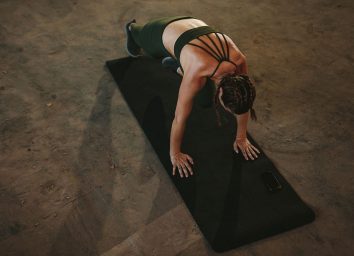You Should Burn This Many Calories Every Day, Say Experts

Figuring out how many calories you should burn every day isn’t mathematically difficult—but it’s practically impossible if you don’t know what you want to accomplish by incinerating that stored up energy. Do you want to lose weight? Gain weight? Maintain your current weight? Depending on your goal, it’ll be a different number.
That burn number also will be impacted by how many calories you consume in a given day. We’re talking about the concept of “calories in vs. calories out.” You’ve heard of this. It’s the idea that to lose weight you must burn off more calories than you consume in a day. And when that doesn’t happen, when you consume more calories than you burn, you gain weight. (Related: 15 Underrated Weight Loss Tips That Actually Work)
Makes sense, right? “Calories in” is every food and drink that passes your lips. “Calories out” (calorie burn) is your body using those calories.
The basic science is accurate, but there’s a lot more going on behind the scenes. Many nutritionists and trainers feel it’s an oversimplification because both calories in and calories burned off are influenced by a host of factors like the type, quality, and ratio of macronutrients you’re eating, your health, quality of your sleep, stress levels, hormones, level of physical activity, even how you prepare your food.
“Each person has a unique metabolism, the rate at which they burn calories,” says Trista Best, RD, MPH, a dietitian with Balance One Supplements. “This is known as your basal metabolic rate (BMR). This number equates to the number of calories they should consume during the day.”
Fortunately, there are mathematical formulas that can help us guesstimate some of those various influences on calories in versus calories out. Let’s walk through the arithmetic (the Harris-Benedict formula) that’ll get you the numbers you’re looking for, starting with your basal metabolic rate, the measurement of the number of calories your body uses just to exist (heart rate, breathing, circulation, etc.).
First, do the calculation based on your gender.
To find out how many calories you need to burn in order to lose weight, you first need to do the calculation to find out how many calories you need to consume in general.
- For women, you need to do the following calculation: BMR = 655 + (4.35 x weight in pounds) + (4.7 x height in inches) – (4.7 x age)
- For men, this is the calculation: BMR = 66 + (6.2 x weight in pounds) + (12.7 x height in inches) – (6.8 x age)
Let’s put this calculation into practice. Take a 5-foot-6-inch woman, age 40, who weighs 160 pounds, for example:
665 + (4.35 x 160 lbs.) + (4.7 x 66 inches) – (4.7 x 40) = 1,483 (BMR)
Factor in your physical activity.
Now, to find out how many calories you need to consume per day to maintain your current weight, you have to factor in your physical activity level, part of that “calories out” hat trick: Multiply the BMR by the numbers corresponding with physical activity level in the table below.
- Little to no exercise / BMR x 1.2 =____
- Light exercise (1-3 days/week) / BMR x 1.375 =____
- Moderate exercise (3-5 days/week) / BMR x 1.55 = ____
- Heavy exercise (6-7 days/week) / BMR x 1.725 =____
- Very heavy exercise (twice daily) / BMR x 1.9 =____
So, if the woman in the example above has a light amount of exercise each week, that would mean multiplying her 1,483 calories (BMR) by 1.375 (light exercise) to get a total of 2,039 calories to maintain her current weight.
Find the proper deficit with your calculated calories.
“Calories in versus calories out really is as simple as it gets from a weight loss, maintenance, or weight gain standpoint,” says Jack Coxall, a strength and conditioning coach and co-founder of Fitness Lab in London. “If someone wants to lose weight, then they will need to maintain a calorie deficit, in other words, burn more calories every day than they consume, until they have achieved their desired weight loss goal. Generally speaking, a deficit of 15% to 20% of daily calorie needs is a good place to start.”
In the example of our 40-year-old woman, a 20% calorie deficit would be about 400 calories—resulting in a total of 1,600 calories consumed. To achieve the proper calorie burn for weight loss, you can either cut calories, increase your exercise, or do a combination of both.
Related: 40 Ways to Burn More Calories Right Now.
However, it still is important to realize that everybody is different—and one person’s needs may not be the same as another’s.
Make the right decisions for your body’s needs.
The number one reason most people struggle to lose weight is they start with the wrong calorie target by incorrectly working out their total daily energy expenditure, says Coxall.
“It’s important to note that calorie calculators can only give us a general estimate of a person’s calorie needs,” says Coxall. “It’s a good number to start with but might need adjusting if it seems like weight loss is not happening, or conversely, happening a bit too fast to be sustainable.”
On the other hand, dropping food intake by a large percentage may trigger faster results, but can easily backfire, warns Dr. Waqas Ahmad Buttar from Sachet Infusions.
“Resistance might build up and cravings might kick in,” says Dr. Buttar. He recommends a slower approach, cutting calorie intake by 10% and then gradually reducing calories or increasing physical activity by another 10%.
Weight loss isn’t the only measurement of success when it comes to getting healthier. Nutrition and fitness coach Rob Arthur, CSCS recommends using calorie calculators as a starting point but relying more on a food diary tracking changes in weight and body composition.
“Track your waist circumference and how your clothes fit,” he says. “How’s your sleep? Are you feeling more energetic and focused? All of these are important measures of progress when making the change to a healthier lifestyle.”
Get even more healthy tips straight to your inbox by signing up for our newsletter!








